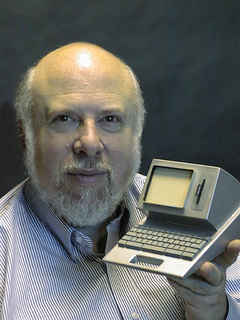A Quote by Ellen Ullman
A computer is a general-purpose machine with which we engage to do some of our deepest thinking and analyzing. This tool brings with it assumptions about structuredness, about defined interfaces being better. Computers abhor error.
Related Quotes
With both people and computers on the job, computer error can be more quickly tracked down and corrected by people and, conversely, human error can be more quickly corrected by computers. What it amounts to is that nothing serious can happen unless human error and computer error take place simultaneously. And that hardly ever happens.
I've never been much of a computer guy at least in terms of playing with computers. Actually until I was about 11 I didn't use a computer for preparing for games at all. Now, obviously, the computer is an important tool for me preparing for my games. I analyze when I'm on the computer, either my games or my opponents. But mostly my own.
We have a tendency to make assumptions about everything! The problem with making assumptions is that we believe they are truth. We could swear they are real. We make assumptions about what others are doing or thinking-we take it personally-then we blame them and react by sending emotional poison in our word. That is why whenever we make assumptions, we're asking for problems. We make assumptions, we misunderstand, we take it personally, and we end up creating a whole big drama for nothing.
The very purpose of our life is happiness, which is sustained by hope. We have no guarantee about the future, but we exist in the hope of something better. Hope means keeping going, thinking, ‘I can do this.’ It brings inner strength, self-confidence , the ability to do what you do honestly, truthfully and transparently.
I've never been much of a computer guy at least in terms of playing with computers. Actually until I was about 11 I didn't use a computer for preparing for games at all. I was playing a bit online, was using the chess club mainly. Now, obviously, the computer is an important tool for me preparing for my games.
I am confident that we can do better than GUIs because the basic problem with them (and with the Linux and Unix interfaces) is that they ask a human being to do things that we know experimentally humans cannot do well. The question I asked myself is, given everything we know about how the human mind works, could we design a computer and computer software so that we can work with the least confusion and greatest efficiency?
For many of us, the computer is the means by which we earn a living. To give it a nod, then, is a way of thanking the tool for what it provides in life. It helps put bread on the table and a roof overhead. It gives us work and pleasure, exercises our minds, brings us information, connects us with other people. It is a partner helping us achieve our goals. Nodding also thanks the unseen hands and minds who helped create our machine.
Of all the things we are wrong about, error might well top the list ... We are wrong about what it means to be wrong. Far from being a sign of intellectual inferiority, the capacity to err is crucial to human cognition. Far from being a moral flaw, it is inextricable from some of our most humane and honourable qualities: empathy, optimism, imagination, conviction, and courage. And far from being a mark of indifference or intolerance, wrongness is a vital part of how we learn and change. Thanks to error, we can revise our understanding of ourselves and amend our ideas about the world.
Every disruptive innovation is powered by a simplifying technology, and then the technology has to get embedded in a different kind of a business model. The first two decades of digital computing were characterized by the huge mainframe computers that filled a whole room, and they had to be operated by PhD Computer Scientists. It took the engineers at IBM about four years to design these mainframe computers because there were no rules. It was an intuitive art and just by trial and error and experimentation they would evolve to a computer that worked.































